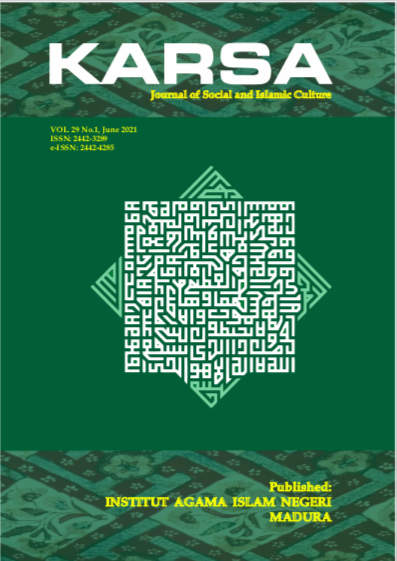Santoso’s Jihadism, Deradicalization, and Humanization: A Preliminary Investigation on Indonesian Terrorism
 Abstract views: 391
,
Abstract views: 391
,
 PDF downloads: 276
PDF downloads: 276
Abstract
Indonesia. The rise of acts of terrorism by Santoso at that time makes the public ask: How far is the deradicalization program? Why do the various community groups become more radical and brave against the apparatus/officers who promote the deradicalization program? Humanization leads to the prevention or overcoming of intensification of conflict and escalation of violence, covering the way for human rights violations or acts of genocide. Humanization refers to a strategy designed to reduce the dynamics of conflict that are destructive and face violence, especially terrorism, as the culmination of radicalism. Indonesia is still not free from inter-religious conflict. Religion, which should be eager to spread liberation and peace for our fellow human beings, is just often breached, even disturbing the integrity of Unity in Diversity. Deradicalization also include humanization because it takes the participation of sincere and serious attention.
Downloads
References
Bureau of Counterterrorism. “Country Reports on Terrorism 2017.” United States Department of State Publication, September 2018. https://www.state.gov/wp-content/uploads/2019/04/crt_2017.pdf.
Chaidar, Al. “Menimbang Program Deradikalisasi.” Media Indonesia, June 22, 2016. https://mediaindonesia.com/opini/57419/menim bang-program-deradikalisasi.
Dancel, Raul. ”Terrorism in Southeast Asia: 3 ASEAN Countries to Work on Action Plan.” The Straits Times, June 23, 2017. https://www.straitstimes.com/asia/se-asia/3-asean-countries-to-work-on-action-plan.
Deutsch, Morton. “Justice and Conflict.” in The Handbook of Conflict Resolution: Theory and Practice, edited by Morton Deutsch and Peter Coleman, 51. San Francisco: Jossey-Bass Publishers Inc., 2000.
Hamburg, David. “Preventing Contemporary Intergroup Violence,” in The Handbook for Interethnic Coexistence, edited by Eugene Weiner, 31. New York: Continuum Publishing, 1998.
International Crisis Group, “Deradicalization and Indonesian Prisons.” Asia Report no.142, November 19, 2007. https://www.crisis group.org/asia/south-east-asia/indonesia/deradicalisation-and-indonesian-prisons.
Irfan, Mohamad. “Kelompok Santoso Ditawari Pengampunan.” Media Indonesia, July 22, 2016. https://mediaindonesia.com/politik-dan-hukum/57494/kelompok-santoso-ditawari-pengampunan.html.
Jong, Hans Nicholas. “Govt to Grant Amnesty to Aceh Rebels.” The Jakarta Post, January 2, 2016. https://www.thejakartapost.com/ news/2016/01/02/govt-grant-amnesty-aceh-rebels.html. See:
Maiese, Michelle. “Humanization Beyond Intractability.” In Conflict Information Consortium, edited by Guy Burgess and Heidi Burgess. Boulder: University of Colorado, 2003.
Olding, Rachel.“The Multi-million Dollar Deradicalisation business,” The Sydney Morning Herald, February 12, 2016, https://www.smh.com.au/national/the-multimillion-dollar-deradi calisation-business-20160212-gmske3.html.
Opotow, Susan. “Drawing the Line: Social Categorization, Moral Exclusion, and the Scope of Justice.” In Conflict, Cooperation and Justice: Essays Inspired by the Work of Morton Deutsch, edited by Morton Deutsch, Barbara Bunker, and Jeffrey Rubin. San Francisco: Jossey-Bass, 1995.
Rothman, Jay. Resolving Identity-Based Conflict in Nations, Organi- zations, and Communities. San Francisco: Jossey-Bass Publishers, 1997.
Rubin, Jeffrey Z., Dean G. Pruitt, and Sung Hee Kim. Social Conflict: Escalation, Stalemate, and Settlement. London: McGraw-Hill, 1994.
Sahrasad, Herdi and Al Chaidar. “ISIS, Indonesian Muslims and Global Terrorism: A Reflection.” JICSA (Journal of Islamic Civilization in Southeast Asia 6, no. 1 (June 2017): 59-91. http://journal.uin-alauddin.ac.id/index.php/jicsa/article/download/4230/3903.
Sahrasad, Herdi and Al Chaidar. Fundamentalisme, Terorisme dan Radikalisme: Perspektif atas Agama, Masyarakat dan Negara. Jakarta: CSS-UI & Freedom Foundation, 2017.
Saloom, Gazi. “Outgroup Contact in the Process of Leaving Terrorism Qualitative Study of Deradicalization and Disengagement Among Former Jamaah Islamiyah Members in Indonesia.” Ahkam: Jurnal Ilmu Syariah 19, no. 1 (2019): 41-61, https://doi.org/10.15408/ ajis.v19i1.10272.
Sapiie, Marguerite Afra. “Rethinking Deradicalization Approach.” The Jakarta Post, January 23, 2016. https://www.thejakartapost.com/ news/2016/01/23/rethinking-deradicalization-approach.html.
Satrawi, Hasibullah. “Deradikalisasi Berbasis Ideologi.” Kompas.com, October 29, 2011. https://money.kompas.com/read/2011/10/29/ 03584393/deradikalisasi.berbasis. ideologi?page=all.
Solahudin, NII Sampai JI: Salafi Jihadisme di Indonesia. Jakarta: Komunitas Bambu, 2011.
Tabrani, Dedy, Al Chaidar, and Herdi Sahrasad. Globalism, Terrorism and Islamism in Southeast Asia. Jakarta: Madani Press, 2020.
Tibi, Bassam. Islamism and Islam. New Haven & London: Yale University Press, 2012.
The journal operates an Open Access policy under a Creative Commons Non-Commercial Share-Alike license. Authors who publish with this journal agree to the following terms:
- Authors retain copyright and grant the journal right of first publication with the work simultaneously licensed under a Creative Commons Attribution License that allows others to share the work with an acknowledgement of the work's authorship and initial publication in this journal.
- Authors are able to enter into separate, additional contractual arrangements for the non-exclusive distribution of the journal's published version of the work (e.g., post it to an institutional repository or publish it in a book), with an acknowledgement of its initial publication in this journal.
- Authors are permitted and encouraged to post their work online (e.g., in institutional repositories or on their website) prior to and during the submission process, as it can lead to productive exchanges, as well as earlier and greater citation of published work.





















